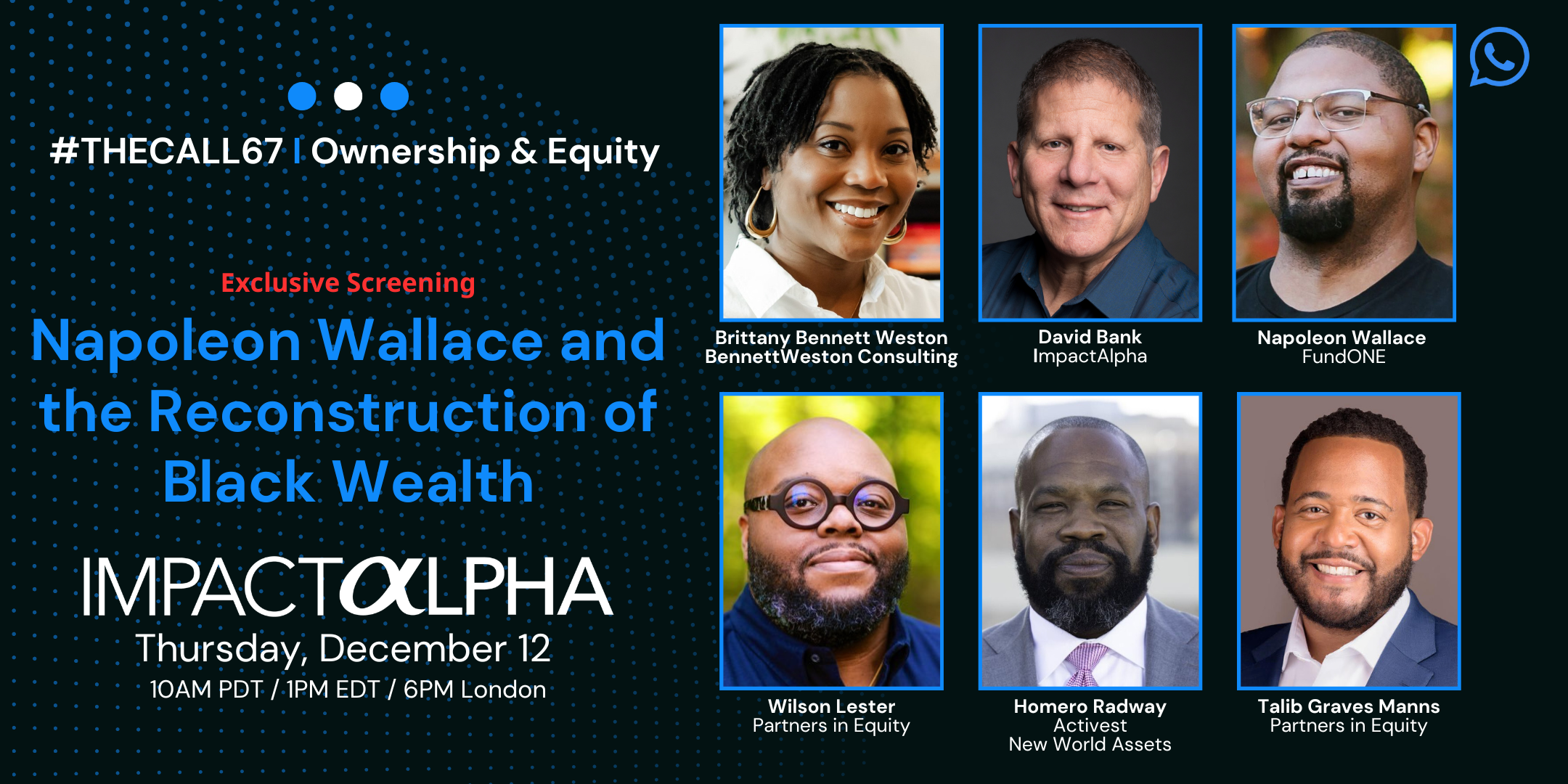ImpactAlpha, May 9 – There’s more than one capital market for startups and small businesses. Venture capital and bank loans finance less than 20% of new businesses.
For the rest, a parallel market of equity, debt and hybrid capital is rising to grow businesses, create jobs and generate wealth. Financing structures like revenue-based financing and innovations like equity redemptions, character-based lending and crowdfunding, are shifting risks, dispensing with obstacles and rethinking terms in order to open up the market for startup capital.
A shift in approach to financing growth is “already in progress,” Kim Folsom of Founders First Capital wrote in ImpactAlpha early this year. Founders First has deployed at least $2 million in revenue-based financing, which allows firms to raise capital by pledging a percentage of future revenues.
“With this model, founders retain equity and investors can count on a reliable return, exactly the type of stability that both parties seek during volatile economic times.”
Folsom is among the Agents of Impact who will share innovative structures on tomorrow’s Call No. 42. Others include Wefunder’s Jonny Price, Astrid Scholz of Zebras United and Armillaria, Ron Boehm of Boma Investments, Andrea Armeni of Transform Finance, and Kevin Jones of Neighborhood Economics. Join The Call, Tuesday, May 10 at 10am PT / 1pm ET / 6pm London.
More than 63% of Founders First’s funding has gone to female founders, and 63% has gone to founders of color. Founders First completed an $11 million Series A last year to help deploy a $100 million credit facility.
Equity crowdfunding, likewise, is diversifying who gets funded by allowing founders to sidestep the often closed networks of venture capital to tap a broader base of fans, users and customers for capital. Dollars invested through the crowdfunding platform reached nearly a half-billion last year, up 130% last year from 2020, according to KingsCrowd, which tracks crowdfunding investment data.
Companies with a Black or Brown founder received roughly one third of the total raised through online startup platforms such as Wefunder and Republic, compared to just 2.6% of venture capital overall. Female founders, who garnered just 2.1% of venture investments in 2021, received almost 20% of crowdfunded capital.
With ‘community rounds,” says Wefunder’s Jonny Price, startups can “let customers invest in them as a way to build stronger relationships with the community and build engagement.”
Performance-aligned
Revenue-based financing meets the needs of a broad set of moderate growth, service-based businesses that are creators of both jobs in underserved communities and wealth for a diverse set of founders. By requiring companies to pay investors a percentage of their top-line sales, up to a predetermined cap, founders avoid the dilution of standard equity investments and retain control of their businesses.
Almost three-dozen firms now provide revenue-based financing, according to one tally. Total historic revenue-based capital allocated has surpassed $2 billion (about three-quarters of that comes from just four firms, Kapitus, Clearbanc, Braavo and United Capital Source). As a comparison, the venture capital industry deployed a record $330 million last year.
To expand access to capital more founders and more types of businesses, investors and fund managers are testing VC alternatives in communities across the country.
A request for proposals from Kauffman Foundation’s Capital Access Lab in 2020 for investment managers providing new kinds of capital to underserved entrepreneurs and communities in the U.S. yielded a pipeline of more than 100 funds. More than half were led by women and 41% were led by people of color. Whereas venture capital funding remains concentrated in the startup hubs of Silicon Valley, Boston and New York, the proposals hailed from 32 states.
Along with Founders First, recipients of investments included Atlanta-based Collab Capital, Capacity Capital in Chattanooga, 1863 Ventures and Anzu Partners in Washington D.C., and San Francisco-based Indie.vc (which shuttered last year). Most are using revenue-based or profit-sharing investing mechanisms.
Relevée, a jewelry business in India, got an early-stage investment several years ago using a variety of revenue-based financing called “performance aligned stock.” Relevée raises living standards with middle-class wages for women artisans and goldsmiths.
Performance-aligned stock can be thought of as an equity investment that acts like debt. Investors receive redemptions from a dividend pool funded through a company’s operating cash flow in alignment with the company’s revenue growth. The mechanism lets investors recoup their capital without a sale of the company, at a predictable rate of return aligned with the company’s revenues. Founders retain control of the company.
“What we were doing was aligning with the entrepreneurial side of things in the social impact space,” says Marlys Boehm of BOMA Investments, which helped develop the structure. “A lot of the money was coming in from the VCs who were not necessarily aligned – they wanted the exit and most social impact entrepreneurs didn’t want to exit.”
In Oakland, Calif., Boston, and New Mexico, local funds such as Runway Project, Ujima Fund and the Boston Impact Initiative are modeling alternative solutions include universal basic income for black founders, “people guarantee pools” and sharing power in investment decision-making and ownership — “the financial infrastructure that is going to love black and brown people” as Runway’s Jessica Norwood puts it.
In North Carolina, Kevin Jones and Rosa Lee Harden have helped pilot a $2.8 million Community Equity Fund to backstop businesses that don’t qualify for loans. “The big problem is that there’s all these loan funds to try to reach marginalized communities and they don’t get out the door, because the people don’t have friends and family funding,” Jones told ImpactAlpha. The answer: “Equity before debt, that’s paid back by revenue share.”
Character-based
Common Future’s recent merger with Uncharted will expand character-based lending and other community-wealth building tools to more communities. Common Future’s character-based lending fund aims to take the place of community banks that once loaned money based on relationships, but are largely absent in underserved communities.
That fund, and separate revenue-based finance fund, says Common Future’s Rodney Foxworth, are “about structuring opportunities in which communities that have been most adversely impacted by economic or racial injustice have control of capital and decision making.”
The $800,000 character-based lending fund, raised by Common Future and its donor network, was designed with partners including Cincinnati-based MORTAR, Native Women Lead and Minnesota-based ConnectUP! Institute, which will refer borrowers. Community Credit Lab helped structure the fund and will underwrite the loans.
Honeycomb and Upstart Co-Lab have pledges of $600,000 from foundations that will join crowdfunders in financing creative businesses in food, fashion and design. More than 80% of the businesses that have raised capital through Honeycomb’s loan crowdfunding platform are local creative businesses such as cafés, breweries, and fashion brands.
And about half of the companies on Honeycomb’s platform were previously unable to access credit. The Loan Participation Fund brings “much-needed financing to businesses in creative industries.”says Upstart’s Laura Callanan.
In Oakland, music producers Bosco and Maya Kante raised financing for their company, Electrospit, to commercialize a device that has been used to electrify voices in musical hits by Bruno Mars and David Guetta, Dua Lipa, Missy Elliot and Madonna. The nonprofit venture capital firm ICA pioneered the use of “impact notes” to return equity shares to the Kantes as they deliver on impact targets such as creation of full-time local jobs, provision of health benefits and distribution of ownership and profits with employees.
“We saw what Y Combinator had done with the SAFE note in venture capital,” ICA’s John Gough told ImpactAlpha. “We thought, ‘why don’t we create something that more embodies our mission and goals?’”
David Bank and Amy Cortese contributed reporting.
Additional resources
10 ways to redesign venture finance for a more inclusive post-COVID world by Aunnie Patton Power. Includes examples of:
- Revenue-based financing
- Dividends-based financing.
- Equity redemptions.
- Venture debt.
- Equity and debt guarantees.
- Factoring.
- Forgivable loans.
- Convertible grants.
- Recoverable grants.
- Holding companies and evergreen funds.
“Innovations in Financing Structures for Impact Enterprises: Spotlight on Latin America” from Transform Finance. Includes case studies on:
- Variable payment obligation,
- Revenue-based loan,
- Flexible debt financing for worker-recovered companies,
- Demand dividend,
- Combined redeemable equity and variable debt,
- Self-liquidating equity for investing in cooperatives
- More.
“Access to Capital for Entrepreneurs: Removing barriers Report (2021 Update)” from
Kauffman Foundation
More coverage from ImpactAlpha:
- Re-plumbing business financing with alternative capital structures
- Beyond venture capital: More impact investors offer alternative financing
- ‘Demand dividend’ emerges as alternative to venture capital financing
- The New Alternatives: Holding Companies that Build Assets and Impact of ‘Infinite Duration’
- Impact investors turn to revenue-based financing to bridge capital gaps for founders of color
- Inclusive capital means more flexible terms and more diverse founders
- As unicorns stumble, investors warm to revenue-based financing for ‘zebras’ and ‘Clydesdales’
- ‘Impact notes’ help entrepreneurs recoup equity by creating good jobs and community wealth
- Equity crowdfunding changes who gets financed
- New crowdfunding rules set to boost investment in diverse startups and founders
- Startups raise ‘community rounds,’ turning customers and fans into investors
- Foundations join the crowd to invest in creative startups through Honeycomb Credit
- More Agents of Impact answer the call for new tools to reshape finance
- Flexible financing can help diverse founders maintain gains in a volatile economy
- Local funds model the racial reckoning and renewal central to the COVID recovery












